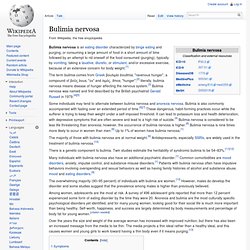

Bulimia nervosa. Bulimia nervosa is an eating disorder characterized by binge eating and purging, or consuming a large amount of food in a short amount of time followed by an attempt to rid oneself of the food consumed (purging), typically by vomiting, taking a laxative, diuretic, or stimulant, and/or excessive exercise, because of an extensive concern for body weight.[1] The term bulimia comes from Greek βουλιμία boulīmia, "ravenous hunger", a compound of βοῦς bous, "ox" and λιμός, līmos, "hunger";[2] literally, bulimia nervosa means disease of hunger affecting the nervous system.[3] Bulimia nervosa was named and first described by the British psychiatrist Gerald Russell in 1979.[4][5] Some individuals may tend to alternate between bulimia nervosa and anorexia nervosa.

Bulimia is also commonly accompanied with fasting over an extended period of time.[6][7] These dangerous, habit-forming practices occur while the sufferer is trying to keep their weight under a self-imposed threshold. Symptoms[edit] Bulimia Nervosa: Signs, Symptoms, Treatment, and Help. What is bulimia?

Bulimia nervosa is an eating disorder characterized by frequent episodes of binge eating, followed by frantic efforts to avoid gaining weight. It affects women and men of all ages. When you’re struggling with bulimia, life is a constant battle between the desire to lose weight or stay thin and the overwhelming compulsion to binge eat. You don’t want to binge—you know you’ll feel guilty and ashamed afterwards—but time and again you give in. During an average binge, you may consume from 3,000 to 5,000 calories in one short hour.
After it ends, panic sets in and you turn to drastic measures to “undo” the binge, such as taking ex-lax, inducing vomiting, or going for a ten-mile run. It’s important to note that bulimia doesn’t necessarily involve purging—physically eliminating the food from your body by throwing up or using laxatives, enemas, or diuretics. Am I Bulimic? Ask yourself the following questions. Are you obsessed with your body and your weight? Amy’s Story. Bulimia: symptoms, causes, treatment, complications, long-term outlook. What is Bulimia?

Bulimia, also called bulimia nervosa, is a psychological eating disorder. Bulimia is characterized by episodes of binge-eating followed by inappropriate methods of weight control (purging). Inappropriate methods of weight control include vomiting, fasting, enemas, excessive use of laxatives and diuretics, or compulsive exercising. Excessive shape and weight concerns are also characteristics of bulimia. A binge is an episode where an individual eats a much larger amount of food than most people would in a similar situation. Bulimia was only diagnosed as its own eating disorder in the 1980s. People with bulimia can look perfectly normal. It is often difficult to determine whether a person is suffering from Bulimia. Sufferers consume huge quantities of food. A Family Member has an Eating Disorder If you have a family member that with an Eating Disorder, your family member needs a lot of support.
Bulimia nervosa fact sheet. Home > Publications > Our publications > Bulimia nervosa fact sheet Jen's story It was ten years ago when I became bulimic. I had always worried about my weight and how I looked. I thought I looked fat, no matter what the scale showed or anyone said. But I had never made myself throw up — not until after college. What is bulimia? Bulimia nervosa (buh-LEE-me-ah nur-VOH-suh), often called bulimia, is a type of eating disorder. Making yourself throw up Taking laxatives (pills or liquids that speed up the movement of food through your body and lead to a bowel movement) A person with bulimia feels he or she cannot control the amount of food eaten. Unlike anorexia , people with bulimia can fall within the normal range for their age and weight. Fear gaining weight Want desperately to lose weight Are very unhappy with their body size and shape Return to top Who becomes bulimic?
Many people think that eating disorders affect only young, upper-class white females. What causes bulimia? Culture. Yes.